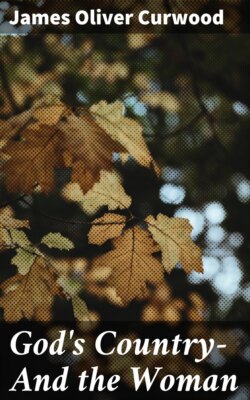Читать книгу God's Country—And the Woman - James Oliver Curwood - Страница 9
На сайте Литреса книга снята с продажи.
CHAPTER SIX
ОглавлениеTable of Contents
At the touch of Weyman's lips to her hair Josephine lay very still, and Philip wondered if she had felt that swift, stolen caress. Almost he hoped that she had. The silken tress where for an instant his lips had rested seemed to him now like some precious communion cup in whose sacredness he had pledged himself. Yet had he believed that she was conscious of his act he would have begged her forgiveness. He waited, breathing softly, putting greater sweep into his paddle to keep Jean well behind them.
Slowly the tremulous unrest of Josephine's shoulders ceased. She raised her head and looked at him, her lovely face damp with tears, her eyes shimmering like velvety pools through their mist. She did not speak. She was woman now—all woman. Her strength, the bearing which had made him think of her as a queen, the fighting tension which she had been under, were gone. Until she looked at him through her tears her presence had been like that of some wonderful and unreal creature who held the control to his every act in the cup of her hands. He thought no longer of himself now. He knew that to him she had relinquished the mysterious fight under which she had been struggling. In her eyes he read her surrender. From this hour the fight was his. She told him, without speaking. And the glory of it all thrilled him with a sacred happiness so that he wanted to drop his paddle, draw her close into his arms, and tell her that there was no power in the world that could harm her now. But instead of this he laughed low and joyously full into her eyes, and her lips smiled gently back at him. And so they understood without words.
Behind them, Jean had been coming up swiftly, and now they heard him break for an instant into the chorus of one of the wild half-breed songs, and Philip listened to the words of the chant which is as old in the Northland as the ancient brass cannon and the crumbling fortress rocks at York Factory:
"O, ze beeg black bear, he go to court,
He go to court a mate;
He court to ze Sout',
He court to ze Nort',
He court to ze shores of ze Indian Lake."
And then, in the moment's silence that followed, Philip threw back his head, and in a voice almost as wild and untrained as Jean Croisset's, he shouted back:
"Oh! the fur fleets sing on Temiskaming,
As the ashen paddles bend,
And the crews carouse at Rupert's House,
At the sullen winter's end.
But my days are done where the lean wolves run,
And I ripple no more the path
Where the gray geese race 'cross the red moon's face
From the white wind's Arctic wrath."
The suspense was broken. The two men's voices, rising in their crude strength, sending forth into the still wilderness both triumph and defiance, brought the quick flush of living back into Josephine's face. She guessed why Jean had started his chant—to give her courage. She KNEW why Philip had responded. And now Jean swept up beside them, a smile on his thin, dark face.
"The Good Virgin preserve us, M'sieur, but our voices are like those of two beasts," he cried.
"Great, true, fighting beasts," whispered Josephine under her breath. "How I would hate almost—"
She had suddenly flushed to the roots of her hair.
"What?" asked Philip.
"To hear men sing like women," she finished.
As swiftly as he had come up Jean and his canoe had sped on ahead of them.
"You should have heard us sing that up in our snow hut, when for five months the sun never sent a streak above the horizon," said Philip. "At the end—in the fourth month—it was more like the wailing of madmen. MacTavish died then: a young half Scot, of the Royal Mounted. After that Radisson and I were alone, and sometimes we used to see how loud we could shout it, and always, when we came to those two last lines—"
She interrupted him:
"Where the gray geese race 'cross the red moon's face
From the white wind's Arctic wrath."
"Your memory is splendid!" he cried admiringly.
"Yes, always when we came to the end of those lines, the white foxes would answer us from out on the barrens, and we would wait for the sneaking yelping of them before we went on. They haunted us like little demons, those foxes, and never once could we catch a glimpse of them during the long night. They helped to drive MacTavish mad. He died begging us to keep them away from him. One day I was wakened by Radisson crying like a baby, and when I sat up in my ice bunk he caught me by the shoulders and told me that he had seen something that looked like the glow of a fire thousands and thousands of miles away. It was the sun, and it came just in time."
"And this other man you speak of, Radisson?" she asked.
"He died two hundred miles back," replied Philip quietly. "But that is unpleasant to speak of. Look ahead. Isn't that ridge of the forest glorious in the sunlight?"
She did not take her eyes from his face.
"Do you know, I think there is something wonderful about you," she said, so gently and frankly that the blood rushed to his cheeks. "Some day I want to learn those words that helped to keep you alive up there. I want to know all of the story, because I think I can understand. There was more to it—something after the foxes yelped back at you?"
